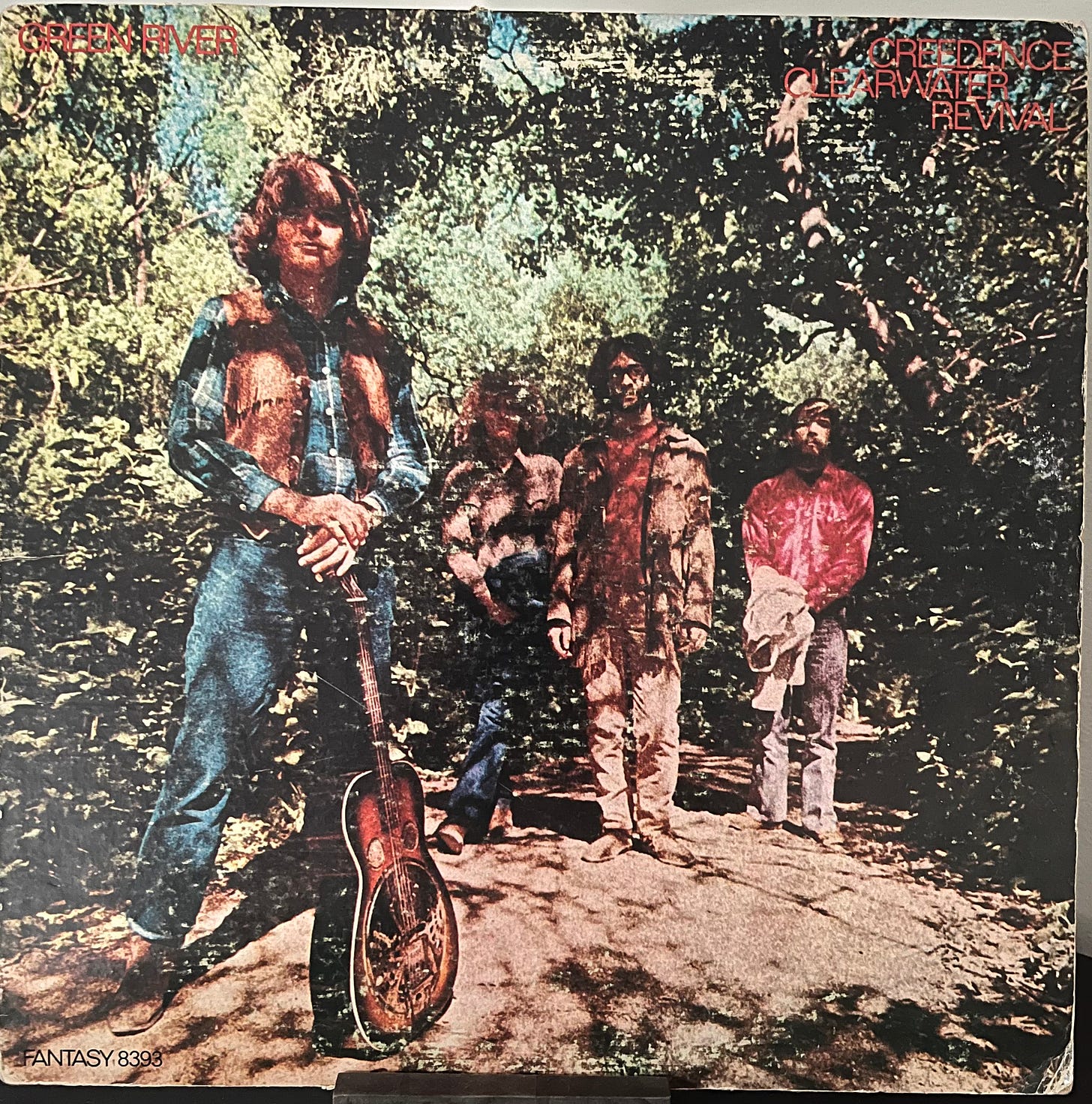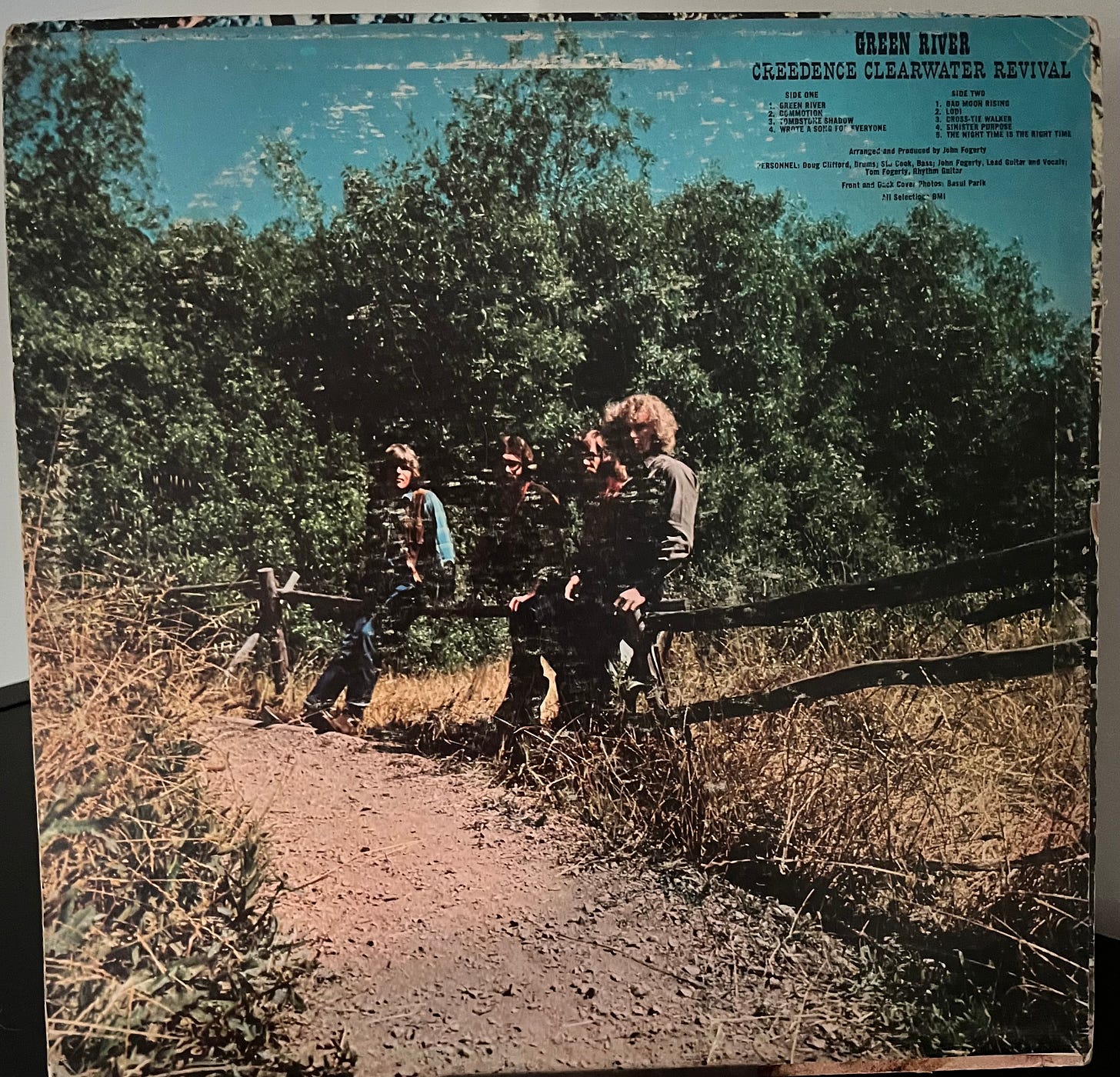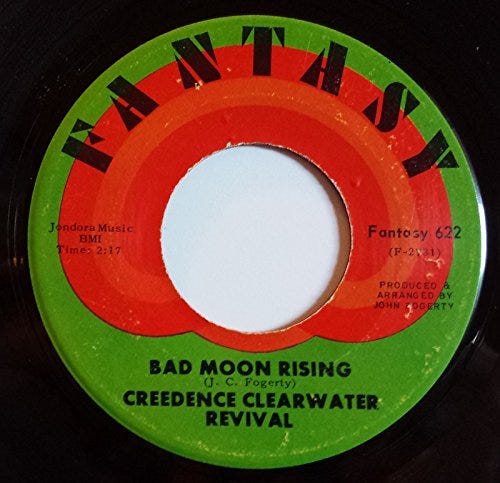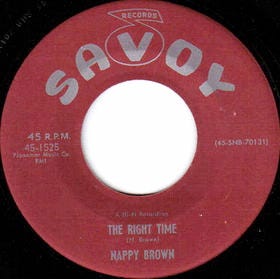A World That's Smolderin' - 55 Years of Green River
Looking back at the second of three masterpieces Creedence Clearwater Revival released in 1969.
One of my very first musical memories was of hearing the raspy shout of John C. Fogerty singing about walking along the river road at night and of moonlit, barefoot, dancing girls. The song was "Green River.” It’s straight, no-nonsense, four-on-the-floor stomp and staccato riff conjured a memory of simpler times, of bullfrogs and skipping rocks. It was imagery I understood, as my mom's side of the family raised tobacco. I used to spend springs and summers, before I was old enough to help in the fields, unwittingly acting out the first two verses of the title track of CCR's third album.
Green River was not only Creedence's third, but it was also the second of what would be three releases in 1969 alone. Bayou Country preceded it in January, and Willy and the Poor Boys would follow in November. It wasn't an issue of quantity over quality, either. These three LPs contained some of the most enduring rock and roll of all time. Bayou Country, for example, boasted both "Proud Mary" and "Born on the Bayou" - one a modern-day standard (boosted by Ike and Tina Turner's definitive treatment a couple of years later) and the other a concert-opening staple that doubled as a sort of statement of purpose. Also included was an incendiary take on Little Richard's "Good Golly Miss Molly,” which edged closer to heavy metal than boogie-woogie. Bayou Country closed with over seven minutes of one-chord, tension-building menace in "Keep On Chooglin'.”
On the other end of '69, Willy and the Poor Boys didn't skimp on the meat either, as it offered up the timeless - and timely - "Fortunate Son," the busker anthem "Down on the Corner," a ferocious take on Leadbelly's "Midnight Special," and the weary, ambiguously ominous epic, "Effigy." It was the album between them, however, that best captured the sound that would define Creedence, and did so in just under half an hour.
The title track of Green River starts with recalling an idyllic country life, but the last couple of lines ominously darken the mood, setting the tone for the rest of the album. As the narrator leaves Green River, he's pulled aside and warned that "the world is smolderin' and if you get lost, come on home." Reality quickly sets in as "Green River" is left behind for the urban life detailed in "Commotion," where traffic is "backed up on the freeway" and "everywhere you look, there's a frown." The tempo is more urgent, the guitar more biting and shrill. The city has changed him to the point where he feels a "Tombstone Shadow" is stretching across his path (as well as the the most ferocious one-note guitar solo this side of "Cinnamon Girl").
Now strung out, our narrator reflects at the end of side one that he's written "a song for everyone" when he can’t even talk to - a friend? a lover? “Everyone” includes those who've lived "thousands of years in chains. Someone says it's different now. Look, it's just the same." Sadly, 55 years on, this verse can still be sung without fear of sounding dated.
To these young ears back then, John Fogerty always sounded mysterious; he never gave away much personally. He came across more like a street-corner preacher pontificating to passersby that they must either change their sinful ways and repent, or pay dearly. Yet "Wrote a Song for Everyone," he turned inward, showing vulnerability for the first time on record, while the music empathized by delivering a slow, melancholy crawl.
Although side two kicked off with a joyful noise, lyrically we were no better off than on the first side. "Bad Moon Rising" reveals the world that old Cody Junior warned us about. Biblically bad - Old Testament bad. Eye for an eye time. Natural disasters: earthquakes, hurricanes, floods, and the "voice of rage and ruin." It's the apocalypse knockin’ at your door. All foretold over a bouncy, chugging Buck Owens/Don Rich-inspired riff. The music mocks your fear.
Our country boy has hardened since his time away from Green River. He finds himself in Lodi, CA, cynical and jaded, playing for drunks who don't care. He wishes he could catch a train back home ("Come on home"). When he gets to the station though, he can't afford to board a fancy passenger car, so he's got to hobo it. With no money coming in, he's now just a "Cross-Tie Walker" - the kind he used to see, and sometimes hang with, back home at Green River ("Up at Cody's Camp, I spent my days with flat-car riders and cross-tie walkers").
"Cross-Tie Walker" chugs along with a rockabilly nod to Carl Perkins and Sun Records. It's the sound of rebellion, of freedom, the desire to make your own path. Sometimes that path doesn't pay too well, if at all. Sometimes desperate times call for desperate measures. Promises of riches and wisdom can tempt you to follow whoever's at your door, even if that person (or figure) may have a "Sinister Purpose."
Maybe the figure at the door was granted entrance. Maybe a deal was made. Either way, the narrator is now back on stage, but the song is not about self-pity or longing for home. Having made that deal, all seems right in the world. In fact, he’s in a damn fine mood, and he has sex on his mind - or at least a good time. He’s channeling his excitement like that street corner preacher. But this time, he’s not warning against the pleasures of the flesh, he’s celebrating them. And baby, just like Ray Charles and Nappy Brown sang before him, the nighttime is the right time to be with the one you love.
Love? Who does he love? Hard to say, because throughout their entire run of albums, Fogerty never wrote a love song. Sure, CCR covered "Suzy Q," "I Put a Spell on You," and "Night Time...," but boy/girl love songs didn't begin flowing from Fogerty’s pen until his fourth solo effort, 1997's Blue Moon Swamp, when he wrote his first bonafide love song. His wife, Julie, was the inspiration for "Joy of My Life".
I brought up the no-love-song observation to Stu Cook and Doug Clifford, CCR's legendary rhythm section, several years ago. They each paused for a moment as if this had never crossed their minds, then admitted that that may have kept them from ever having a number one hit. (Creedence famously stalled at number two more than anyone at the time.)
Green River was released 55 years ago on August 3rd, 1969. Within two weeks, they would perform for an audience of over 400,000 at the Woodstock Music and Arts Fair. (Their performance, not approved by Fogerty for the soundtrack or the movie, is now fully available and not to be missed. You can find the stream for it below.) They followed the Grateful Dead and Mountain, going on after midnight. Fogerty was never happy with their performance. Listening back, I can't imagine what he would consider a great performance because they had the crowd under their spell for the hour they were on.
It's hard to name the "best" Creedence album, but usually, it's a toss-up between Willy and the Poor Boys and Green River. When you realize there's also Bayou Country and Cosmo's Factory to consider, it seems an impossible task. (In case you're wondering, while I do love their debut as well as Pendulum, they're not nearly up to the standard of the other four - and the less said about the career-ending Mardi Gras, the better.) As for Green River, its lyrical themes are timeless, its music just as powerful today as it was then, proving that leaving home in search of bettering yourself and learning to navigate the big smolderin' world will always be frightening, but there's solace in knowing deep down, that if you get lost, with apologies to Thomas Wolfe, you can always come home, even if it's just by way of a song, album, or memory from 55 years before. Come on home.






Great post. I like these CCR deep dives because I always simply took them for granted—they were just always “there,” which says something about the timelessness and strength of the songs. You’re doing something interesting by looking at a band that was, and still is, incredibly popular. People champion unknown bands, all the time, which is also great to do, but this is also really interesting.
Nice piece. Green River has always been a favorite of mine. Every cut on the album is aces. That one and Cosmo's Factory spent a lot of time on my turntable back in high school. My parents even dug 'em. Thanks for taking the time to unpack the history.
I'm sure you've seen the Cosmo's Factory/ Fogerty's Factory take, when John and his family was hunkered down in Quarantine during the pandemic. Great stuff.
https://youtu.be/3a8w1ri_TwM?si=r0Y6hFcnO083z0pi